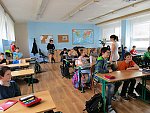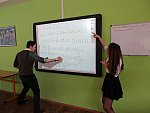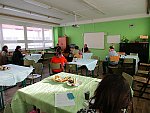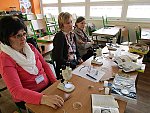Mensa Conference on Talent Development – February 2016
The conference was held at the lovely and inspirational premises of the Parliament of the Czech Republic. The opening speech by Ass. Prof. PhDr. Šárka Portešová, Ph.D. was dedicated to the current development in the care for talented and gifted children from a long-term perspective.
Conference Day 1 (23rd February 2016)
Ass. Prof. Portešová presented the results of studies she undertook with her team, and focused in detail on topics of gifted children with learning difficulties, as well as early readers. In particular, a combination of gift and dyslexia was discussed, as in most cases, all the focus was on their handicap, instead of on their exceptional capabilities in other areas. As Ass. Prof. Portešová said: “Trying to rectify the deficit is a bad reaction of adults. The principal task of the educator should lie in developing their talents.” I was really intrigued by the lecture, and I acquired a lot of new knowledge and stimuli for my own work with these children, as well as a new view of the problematic topics in education.
The lecture of Dr. Jiří Rozehnal filled me with energy and zest for working with children, as well as creating new activities in pre-school education and preparation of the pre-schoolers for primary school. Dr. Rozehnal showed us how the education of gifted children can be carried out in an ordinary primary school. It was obvious that he has long-time experience with that issue, and that he is a real expert and enthusiast, working where he belongs. The real examples of changes in the method of education of pupils at primary school level were very inspirational.
PhDr. Alena Nováková and Mgr. Ivana Valčíková from Křídlovická Primary School in Brno presented their methods and ways of working with gifted children. I was intrigued by the “enhancement method” used during lessons, as well as the offer of extra-educational activities, which allows children with common interests to meet outside the lessons and to strengthen their mutual social bonds. Dr. Nováková presented her own experience with working with the electronic pupil’s record book, and encouraged her colleagues not to be afraid, and to use this tool to work and communicate with both parents and children. The electronic book can be used both for assigning homework, some of which is voluntary – and despite this, children usually happily do that homework, and even send videos of their own solutions, which sounded absolutely fantastic to me. We had an opportunity to watch one of these videos, and it was obvious that the children like doing their homework, that they have fun doing it, and that they learn using their own initiative in a spontaneous way, which should be the goal of any good teacher.
ABAKU – I am going to remember this word forever. I never heard of this game before, and I had no clue what it meant. When Mgr. Alena Vávrová handed us worksheets covered with a multitude of series, numbers, and matrices, which were completely incomprehensible at first glance, I started to doubt if I was in the right place. However, once Ms. Vávrová explained the mathematical game to us and we tried a couple of worksheets under her leadership and with her help, both my colleague and I became absolutely intrigued, and I had a problem to stop playing. I envy the pupils of Ms. Vávrová, as mathematics in her concept is great fun. “Abaku supports natural playfulness, replaces drills, and helps develop mathematical skills.”
The next panel made us aware of the NTC Learning system, intended for pre-school education in kindergartens. As I use that method myself and know it well, I can also compliment on the lectures of the presenters. An interesting practical demonstration from Horní Slavkov kindergarten presented photos, beautifully illustrating how the teachers work with this method, and how easily it can be incorporated into pre-school education plans. The NTC Learning method is really unique and systematic, develops children’s intellectual skills, and children love it. An introduction to the Logical Olympiad for Kindergartens followed. We have participated with our kindergarten kids in the past, and we are already looking forward to participating again, as well as looking forward to promoting it to kids’ parents. As the tasks are presented in a pictographic way, even children from the age of 3 can participate. The importance of the Olympiad lies in its motto – “The key is to identify children’s potential at the youngest possible age!”
Ing. Hana Kotinová inspired us in the field of memory training, and introduced us to some techniques that can be easily utilized in everyday life. She taught us to play pairs in several ways, and presented the possibility of the production of one’s own pairs game, as well as other games. I was also intrigued by the presentation of several memory and quiz games on the market, such as BrainBox, Pengolo, Do pigs fly?, Where is Sleepy Hollow, etc., some of which I already managed to order.
There was another beautiful and positive thing about the conference – we were all connected by one important topic, which is education of the future generation, i.e., our children, in whom we lay our hopes, and who are the objects of loving care of all lecturing pedagogues. Searching for new ways and possibilities in education is a challenge for all of us who work with children, whether with the youngest children, or with young people at an age when they should have made their first big life choices already, but who, as apparent from various studies, still sometimes need our help. Advice and support in studiousness can often help them reach their most secret wishes and dreams for the future, and we, pedagogues, are here for them with our unique Mensa NTC Learning system of education, to help them. I am proud of being able to participate in this exceptional training programme, and I would like to thank all of the above-mentioned educators for their invaluable contributions. Of course, I would also like to thank all of the participants of the conference, as by participating, they made it obvious that they are interested in the improvement of the current standards of education, as well as its methods.
Thank you, all of the conference organizers, as well as Mensa CR, for an amazingly inspirational day.
Mgr. Dominika Průchová, Ph.D.
Child Centre Mláďátka – nursery and kindergarten, České Budějovice
|
Mensa Conference on Talent Development (February 2016): Conference Day 1
23.2.2016 Lenka Šnajdrová |
|||
|---|---|---|---|
 |
 |
 |
 |
Conference Day 2 (24th February 2016)
On 24.2.2016, our school hosted a part of the Mensa conference “Mensa for Talent Development”. The participants were offered the chance to observe several demonstration lessons and 7 workshops.
During the lessons, conference participants had the chance to observe several methods of active learning (I.N.S.E.R.T. cube, the diamond, the double notepad, jigsaw learning, free writing, last call, brainstorming, mind maps, etc.) as well as work with didactic technology (ActiveExpression voting device, dataloggers by the Vernier company), experiments associated with evaporation and state transitions, English lessons with discussions on hot and controversial topics of the day, or readers’ workshops in the literature lessons.
The workshops gave the participants an opportunity to find out something new about leisure time and outdoor activities, about the psychological problems of gifted children, and about children with Asperger syndrome, or about the ways of linguistic consultancy in foreign language lessons. They also had an opportunity to practically try the method of fossil sluicing, to get acquainted with our school’s experience with training of learning competencies in children, and with method development of educational skills in teachers through mentoring with created criteria of the teachers’ work at Mensa Grammar School. The menu was really plentiful, and we believe that everyone found their cup of tea.
We would like to express thanks to all of the participants for their participation and words of praise, as well as to all of the organizers, students, and teachers for a job well done, and for their help with conference organization. Looking forward to meet you all next year!
Mgr. Marcela Fatrová
The Mensa Grammar School
|
Mensa Conference on Talent Development (February 2016): Conference Day 2
24.2.2016 Marcela Fatrová |
|||
|---|---|---|---|
 |
 |
 |
 |
Related topics
28.2.2016
